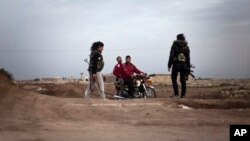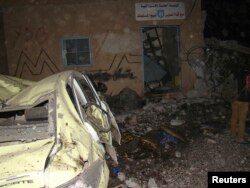QAMISHLI, SYRIA —
In the past few weeks, Kurdish militias have cleared a growing number of towns in northeast Syria of al-Qaida-affiliated groups. But now they are trying to combat a jihadist bombing campaign.
Kurds in Qamishli, the biggest town in Syria’s Kurdish-dominated northeast, are relieved to have been liberated from a months-long jihadist reign of terror consisting of kidnappings for ransom and slayings.
Sitting with neighbors outside a shop in the downtown Souk district of Qamishli, 57-year-old Mikhtar said people felt a lot safer.
“Before, there was a lot of fear because of the kidnapping. The main thing was the kidnapping and a lot of people were kidnapped for ransom and some of them never returned back,” he said.
But, while militiamen in the People’s Defense Units, or YPG, prove increasingly successful against al-Qaida affiliates on the battlefield, they are at a loss about how to combat a burgeoning jihadist car and suicide bombing campaign.
Since the summer in Syria, there have been 39 bombings, including two suicide attacks. At least 30 people have been killed and dozens wounded. Several bombings have been in the town of Kobani near the Turkish border. In the latest attack on November 11, a suicide bomber exploded a large device in a truck outside the offices of the Kurdish Red Crescent killing 11 people, including a nurse and several children.
YPG commander Giwan Ibrahim feared more bombings are to come. And he said there was little he could do to stop them.
“We have got no experience or technology so we use primitive ways to protect ourselves at the checking-points. I mean we don’t use any technology. So that is one of the things making it more difficult to control,” he said.
At checkpoints outside Kurdish-controlled towns and villages, it is difficult for untrained defense volunteers to identify threats, such as knowing where to look for bombs in cargoes of fruit and vegetables.
Ibrahim said it was also difficult to distinguish combatants and non-combatants, or even tell the difference between Kurds and Arabs without engaging in an unwanted form of racial profiling.
“Arab and Kurd are very similar -- in dress, in body language even in the olive skin so it very easy for Arabs to come in or out,” he said.
Kurdish security officials said the bombers were not Syrian but were jihadists from Saudi Arabia, Libya, Tunisia and Iraq. And they were not only making improvised bombs from artillery shells and mines, but also using C4 plastic explosives and ammonium nitrate, a specialty of Iraq’s al-Qaida group.
They were also equipped with remote-controlled technology. Ibrahim claimed Turkish border guards allowed jihadists to cross, an accusation Turkey’s prime minister denied.
“The Kurdish villages are just a few meters away from the Turkish border so anyone can come from the Turkish border and do whatever they want and the Turkish guards allow anybody to get in,” he said.
The Kurds have asked the West for technology to help them combat the jihadist bombing campaign. But with Turkey angry over a self-rule declaration by the Kurds earlier this month, assistance is not likely to be forthcoming.
Kurds in Qamishli, the biggest town in Syria’s Kurdish-dominated northeast, are relieved to have been liberated from a months-long jihadist reign of terror consisting of kidnappings for ransom and slayings.
Sitting with neighbors outside a shop in the downtown Souk district of Qamishli, 57-year-old Mikhtar said people felt a lot safer.
“Before, there was a lot of fear because of the kidnapping. The main thing was the kidnapping and a lot of people were kidnapped for ransom and some of them never returned back,” he said.
But, while militiamen in the People’s Defense Units, or YPG, prove increasingly successful against al-Qaida affiliates on the battlefield, they are at a loss about how to combat a burgeoning jihadist car and suicide bombing campaign.
Since the summer in Syria, there have been 39 bombings, including two suicide attacks. At least 30 people have been killed and dozens wounded. Several bombings have been in the town of Kobani near the Turkish border. In the latest attack on November 11, a suicide bomber exploded a large device in a truck outside the offices of the Kurdish Red Crescent killing 11 people, including a nurse and several children.
YPG commander Giwan Ibrahim feared more bombings are to come. And he said there was little he could do to stop them.
“We have got no experience or technology so we use primitive ways to protect ourselves at the checking-points. I mean we don’t use any technology. So that is one of the things making it more difficult to control,” he said.
At checkpoints outside Kurdish-controlled towns and villages, it is difficult for untrained defense volunteers to identify threats, such as knowing where to look for bombs in cargoes of fruit and vegetables.
Ibrahim said it was also difficult to distinguish combatants and non-combatants, or even tell the difference between Kurds and Arabs without engaging in an unwanted form of racial profiling.
“Arab and Kurd are very similar -- in dress, in body language even in the olive skin so it very easy for Arabs to come in or out,” he said.
Kurdish security officials said the bombers were not Syrian but were jihadists from Saudi Arabia, Libya, Tunisia and Iraq. And they were not only making improvised bombs from artillery shells and mines, but also using C4 plastic explosives and ammonium nitrate, a specialty of Iraq’s al-Qaida group.
They were also equipped with remote-controlled technology. Ibrahim claimed Turkish border guards allowed jihadists to cross, an accusation Turkey’s prime minister denied.
“The Kurdish villages are just a few meters away from the Turkish border so anyone can come from the Turkish border and do whatever they want and the Turkish guards allow anybody to get in,” he said.
The Kurds have asked the West for technology to help them combat the jihadist bombing campaign. But with Turkey angry over a self-rule declaration by the Kurds earlier this month, assistance is not likely to be forthcoming.





